 Files
Files
|
|
|
|
|
The EU - the nature of the beast
The European Union can be analysed and debated from a variety of different perspectives - political, historical, cultural, economic. But it is only from a spiritual perspective that it can be truly understood.
first published 13/12/07
by Watchman
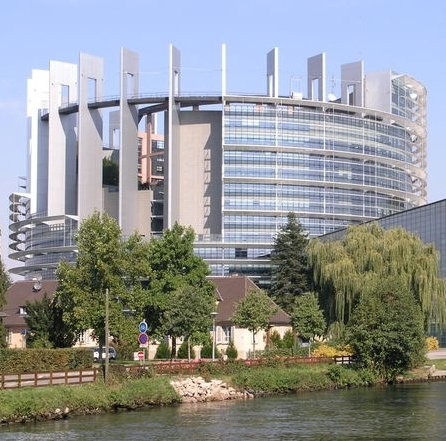 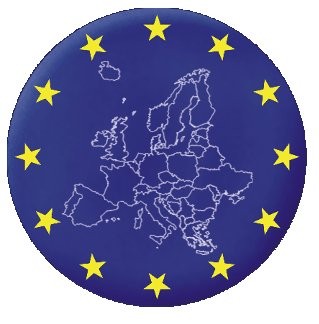 In the aftermath of the second world war, political leaders - the prime movers being France and Germany - made the initial moves to create what is now know as the European Union. And the succession of names given to the growing alliance illustrates the progression in geographic, economic and political scope from the late 1940s until the present day. In the aftermath of the second world war, political leaders - the prime movers being France and Germany - made the initial moves to create what is now know as the European Union. And the succession of names given to the growing alliance illustrates the progression in geographic, economic and political scope from the late 1940s until the present day.
-
The European Coal and Steel Community The ECSC was formed in 1950 and this act of bringing coal and steel - as the means of production and the raw materials for the machineries of war " - under one roof" was seen as a way of preventing future European conflict. The six founders were France, Germany, Belgium, Italy, Luxembourg and the Netherlands. However the scope of the ECSC was set to expand to become -
-
The European Economic Community (EEC - or "Common Market) The Treaty of Rome was signed in 1957, and this treaty formalised both the geographic enlargement that has since progressed, but also the huge expansion of scope to cover most spheres of commerce and industry. The term EEC was very quickly replaced by -
-
The European Community (EC). By dropping the word "economic" from its title the EEC (EC) takes an authority over all areas of life. In turn the term "community" was then replaced to become -
-
The European Union (EU). Through a succession of boundary enlargements, the "Union" now includes countries from the former Soviet Union (FSU).
Successive boundary enlargements
In 1973 the European Communities were joined by Denmark, Ireland and the United Kingdom, followed by Greece in 1981, Spain and Portugal in 1986, Austria, Finland and Sweden in 1995.
In May 2004, the European Union expanded into Central and Eastern Europe. Ten new countries joined the EU: Cyprus, the Czech Republic, Estonia, Hungary, Latvia, Lithuania, Malta, Poland, Slovakia and Slovenia.
Bulgaria and Romania joined this year (2007), while Croatia and Turkey are also candidates.
So what started in the late 1940s as an alliance of 6 countries (nation/states) relating to the coal and steel industries has progressed to become something far beyond its beginnings.
(For an overview of the geographic expansion <click here>.)
The Lisbon Treaty - 13 December 2007
The treaty signed on 13 December 2007 is a replacement for the failed Constitution which was rejected by the French and the Dutch in 2005; and - amongst other things - creates the permanent post of President of the European Union and a de-facto office of EU Foreign Secretary. Most European leaders acknowledge that the main substance of the constitution will be preserved.
(For more detailed information <click here>.)
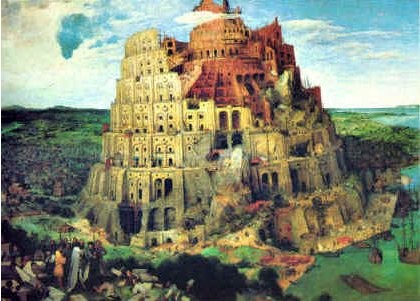
Brueghel's painting of the Tower of Babel
The Empire of Europe - Babel reborn?
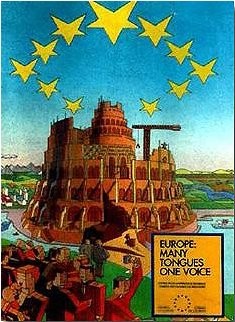 Whilst there are markedly different views on the philosophies under-pinning the formation, expansion and role of the EU, there will be very few, on both sides of the debate who will disagree with the use of the term "super-state" to describe what the EU has now become. What we are witnessing is the creation of a latter-day european empire. Whilst there are markedly different views on the philosophies under-pinning the formation, expansion and role of the EU, there will be very few, on both sides of the debate who will disagree with the use of the term "super-state" to describe what the EU has now become. What we are witnessing is the creation of a latter-day european empire.
Supporters see european integration as creating the climate for peace and prosperity. Others think differently.
Initially created in an attempt to prevent european conflict many now feel that the EU - in what it has now become - sets the scene and creates the conditions for future strife.
From a biblical perspective, many Christians - supported by the EU's determination to exclude reference to God from its failed constitution - feel that what is apparent is an end-time manifestation of the spirit of Babel.
According to the BBC the European Parliament building in Strasbourg incorporates a unique sound and lighting system which will cause the dome of the parliament chamber to light up as the volume (noise level) of discussions rises. The BBC report states: A lighting system made up of optical fibres is installed like a constellation around the dome of the amphitheatre, blinking more or less intensely according to the sound level of the parliamentary debates.
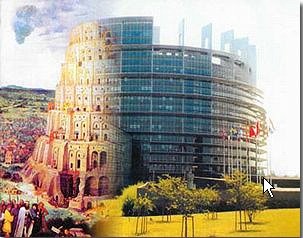
===========
Ed footnote: What do we make of all of this? Answers on a postcard; or by hitting the "Comment" button below.
|
Watchman, 24/05/2016
|
(page
1
2
3
4)
| |
|
Rosemary Cameron |
21/05/2009 22:15 |
I am trying to compare the different party manifestos in order to decide who to vote for in the EU elections however, with only 2 weeks to go, the Christian Party Christian People's Alliance (CPCPA) do not seem to have published a manifesto - only a few policies on their webpage www.votechristian.info - and the lead candidate for Scotland, Sheila McLaughlin (erstwhile council candidate) is unable to answer the questions I put to her about the party's policies. If anyone out there can direct me to a manifesto for the CPCPA I would be very grateful. If anyone from the CPCPA is reading this, don't assume I'm going to vote for you just because you have the word 'christian' in your title (twice). I want to know your policies, in detail, including, but not restricted to, your policy on Scottish fisheries, your policy on Britain and the Euro and your policy on the working time opt-out.
|
| |
|
EU Watcher (Guest) |
03/02/2010 16:44 |
Mr. Van Rompuy the first President of the European Counil will be as strong as the 27 leaders behind him make or want him to be.
This new position paves the way for the "one voice" Europe has lacked on international issues that could rival the power of the United States president-especially since no provisions are made to stop the European Commission president from being elected president of the Council, effectively combining two leading positions into one.
According to the EU website, current bylaws do "not prevent the President of the European Council from holding another mandate at the same time within another European institution.
This allows for the possibility, in [the] future, of combining the functions of President of the European Council with those of the President of the Commission, if the Member States so wish."
|
| |
|
Me (Guest) |
22/07/2011 23:49 |
We are all mistaken and blinded, Europe is just one part of the world as such cannot represent the tower of babel, as the tower of Babel was the entire World. so it must be something concerning the entire world. New world Order is the new tower of babel I hope we wake up. but it has no future it will be destroyed once again by the God of Abraham Issac and Jacob. By our Lord Jesus Christ.
|
| |
|
Martin Lisemore |
25/07/2011 18:17 |
Let's get things in order here. Many are the church and political groups flailing around about an evil Europe (which I also subscribe to) but the Bible gives us no mandate to worry about that as a primary concern.
1 Peter 4:17 gives us the direction, the lead, and a clue of the result. My thesis remains, let's get the church, or Church, or in a New Testament order first, before judgement is enacted upon it, and then we will have the tools to discern correctly Europe, and so much more.
If pushed, I would say judgement is already falling on the church, so there isn't time to waste fretting about Europe while the church rots at it's heart.
We absolutely need to get it right by Jesus, not run around with proclamations of prophecy when our church is rotten.
|
| |
|
Editor |
12/09/2012 10:56 |
EU Commission President Jose Manuel Barroso has called for the EU to evolve into a "federation of nation-states".
Addressing the EU parliament in Strasbourg, Mr Barroso said such a move was necessary to combat the continent's economic crisis.
He said he believed Greece would be able to stay in the eurozone if it stood by its commitments.
Mr Barroso also set out plans for a single supervisory mechanism for all banks in the eurozone.
He called the plans a "quantum leap... the stepping stone to the banking union".
The European Central Bank would get much greater powers of oversight and regulation of Europe's 6,000 banks under the plan.
Read on..http://www.bbc.co.uk/news/world-europe-19568781#
|
| |
|
Editor |
08/04/2013 14:06 |
Margaret Thatcher (1925 - 8 April 2013)
On this day former UK Prime Minister Baroness Margaret Thatcher died.
Her political demise however was brought about 'in the house of her friends'. She was forced out of office on 28 November 1990.
An article in the Telegraph (22/11/10) stated:
"It is true that it was the unpopularity of the poll tax (though not the effect of the riot) that made backbench Tory MPs waver in their allegiance to Mrs Thatcher. They feared for their seats.
"But the process by which she was brought down was instigated not by the rank and file, but by the high command, and not because of the poll tax.
"What concerned many of her ministerial colleagues were her views on Europe. What they feared even more than her losing them the next election was her winning it.
"Suppose she had got a fourth term. She would have had a mandate for the referendum on the European single currency (what is now the euro) which she wanted, and she would have won it in favour of Britain staying out. The euro dreams of Geoffrey Howe and Michael Heseltine would have died.
"She was the victim not of the righteous anger of the masses, but of a coup by people who, in the misleading parlance of the House, are called ''Right Honourable Friends’’.
"Among the consequences of the coup were the rise of Tony Blair, the collapse of the Conservative vote for the next three elections, and the happier fact that no government, despite its cravings, has dared to take us into the euro.
"Precisely 20 years on, as we survey the ruin of Greece, Ireland and Portugal (next week, Spain?), from the relative safety of the sidelines, we can ''just rejoice’’ that Mrs Thatcher’s political career did not die in vain."
Read full article:
http://www.telegraph.co.uk/comment/columnists/charlesmoore/8150464/Margaret-Thatchers-resignation-A-career-that-did-not-die-in-vain.html
|
| |
|
John Miller |
09/04/2013 09:49 |
Unlike the publicity seeking pragmatists that inhabit today's corridors of power, Margaret Thatcher resolutely pursued policies that she believed were right for the country, having little regard for personal popularity.
|
| |
|
stephen (Guest) |
09/04/2013 10:34 |
Editor.
Thatcher was in many ways out of her depth and sowed the seeds of our current difficulties regarding Europe.
By signing the single European Act she was a co-author of the behemoth it has become. The completion of the internal market of which she was a powerful promoter had elements such as the free movement of peoples and goods which have turned out to be forces that we have been unable to control.
By promoting the expansion of the euro area she paved the way for swathes of immigration from Eastern Europe.
Her policy of shadowing the deutsche mark led to a too high exchange rate which adversely affected our exports at just the wrong time.
Her followers claim that arch eurosceptics can trace their roots to her legacy. In fact it was Thatcher who put us on a course towards ever integrating European Union.
|
| |
|
Editor |
10/04/2013 10:27 |
Stephen, I merely quoted what another had written.
However (and just to be clear) I am not saying that Margaret Thatcher was the 'saviour of the nation' regarding being drawn (or not) into the EU. But what I would say is that there will be few who would argue against the view that we would be much further in had she not been in power at the time.
And of course this is not to say that we shouldn't be in the EU. The superstate is showing itself up in its true colours and its policies have created a backdrop for the next major pan-European conflict.
However, even that may be part of God's judgement on the nations (including our own) as we get ever closer to the return of Christ and the legions of Hell rise up against His appearing. Psalm 2 puts it far more eloquently than I ever could.
|
| |
|
(Guest) |
10/04/2013 14:47 |
When Margaret Thatcher came to power Britain was "the sick man of Europe". Dead bodies could not be buried and were being stored in morgues, rubbish was piling up in the streets, unemployment was at a record level and the Trade Union Barons enjoyed beer and sandwiches at 10 Downing Street while dictating policy to the hapless Labour Prime Minister Callaghan.
When Mrs Thatcher left power she had broken the power of unelected organised labour and more than halved unemployment. She won three General Elections on the trot and who put her in power? It was the working classes. Much, much more could be said about her achievements, for example the Falklands War, but I would make another significant point.
She was brought up in a hard working, God fearing family that attended the local Methodist chapel and I believe this as well as her father's belief in self-reliance and hard worked shaped her philosophy. In retirement she and her husband (until his death) were regular church attenders. I do not know if she was a born again believer in the Lord Jesus Christ but she may have been.
In any case her policies and political philosophy did not generally run counter to Christian principles. The left-wing myth that she destroyed the coal mining industry industry was a colossal lie. Arthur Scargill and his ilk managed that without help. The same can be said of much of Britain's now defunct manufacturing base. Restrictive practices insisted upon by the unions made Britain uncompetitive and unattractive to industry, resulting in jobs going elsewhere.
To claim that Margaret Thatcher was out of her depth is a ludicrous distortion of fact. The present chancers in government as well as those who oppose are pathetically ill-equipped and incompetent in comparison, pursuing popularity over principle at every twist in the political path. Mrs Thatchers hard work ethic and legendary attention to detail is unrivalled to this day.
Since her forced departure we have had a succession of incompetents, conmen and spin merchants in government.Failure and immorality have been rewarded by promotion and few if any have been prepared to take responsibility for wrongdoing. The country has been led into an illegal war on the basis of lies, it has been plunged into debt that will take years to years to pay off and moral standards have fallen over the edge of a cliff because the country has turned its back on the basic principles of righteousness and rectitude advocated in God's word.
Like every politician Baroness Thatcher made mistakes but when compared to those who followed she towers above them
|
(page
1
2
3
4)
|
|
|